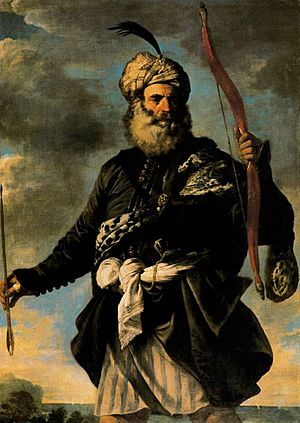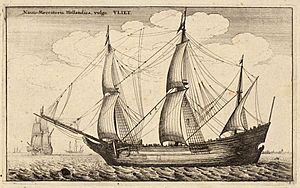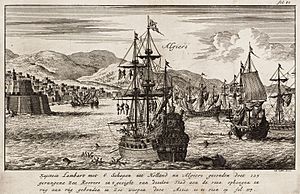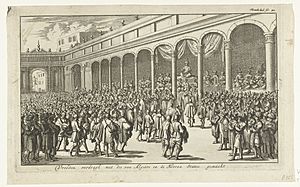Dutch-Barbary war (1618-1622) facts for kids
Quick facts for kids Dutch-Barbary war (1618-1622) |
|||||||
|---|---|---|---|---|---|---|---|
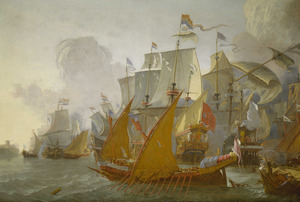 A battle between Dutch ships and Barbary pirates. |
|||||||
|
|||||||
| Belligerents | |||||||
| Commanders and leaders | |||||||
| Strength | |||||||
| Lambert's 2-3nd fleet: (1618-1620) 13 ships De Zoete's fleet: (1620-1621) 17 ships |
Began as 60 ships in 1613, then grew to 80-90 in 1620 | ||||||
| Casualties and losses | |||||||
| 36 Ships seized | 16-20 ships captured, or destroyed | ||||||
The Dutch-Barbary War (1618-1622) was a fight between the Dutch Republic and Barbary pirates. These pirates were attacking Dutch trading ships. The Dutch sent their navy to stop these attacks and protect their valuable trade routes. In the end, the Dutch won, and both sides agreed that peace was important for their economies.
Background: Why the War Started
In the early 1600s, Barbary pirates became very active. They operated in the Mediterranean Sea, attacking ships and stealing their goods. These pirates grew in number and became a big problem for countries trading in the region.
At the same time, the Dutch Republic was having a very successful period. This time is known as the Dutch Golden Age. The Dutch were becoming a major power on the seas. They had a huge international trade network. They set up colonies and trading posts all over the world. This included places in Asia, Africa, and the Americas. They traded valuable goods like spices, textiles, and precious metals. Because of this, the Dutch were one of the richest trading nations of that time.
The Dutch were very active in the Mediterranean Sea. They traded a lot with countries along its coast. Their ships carried many valuable products. This made them a target for the Barbary pirates. The pirates wanted to steal the wealth from Dutch ships. They often harassed and attacked them. Because of these attacks, the Dutch government declared war in 1618. They went to war against both Tunisia and Algiers.
The War Begins
Two Dutch commanders, Mooy Lambert and Hillebrand Gerritsz. Quast, were sent into action. Quast managed to capture many North African ships. When he met more pirate ships on his way back, he dealt with the captured pirates very strictly.
Meanwhile, Mooy Lambert was given the job of patrolling the Mediterranean. His mission was to fight the Algerian pirates. He was very good at this. While sailing through the Strait of Gibraltar, Lambert met a large Algerian fleet. It had between 20 and 30 ships. A fierce battle lasted for two days. Lambert won, capturing 12 to 20 of the enemy's ships. The remaining pirate ships fled. Lambert also dealt with their crews in a very strict way. This was a big victory for him.
The war continued, and the Algerians took the Dutch ambassador prisoner. This made the Dutch very angry. They sent more ships to Lambert's fleet to get their ambassador back. The Algerians eventually gave in and freed the ambassador.
Algiers did not want a full-scale war with the Dutch Republic. So, they offered peace to the Dutch in 1619. The Prince of Orange wanted to keep fighting. He hoped to completely defeat Algiers. However, the States General (the Dutch government) thought it was better to make peace. They accepted the truce.
But the truce did not last long. Algiers broke the peace by attacking another Dutch ship. This led to more fighting. In response, the Dutch sent another fleet. This fleet was led by Willem de Zoete. They also told all Dutch traders to sail with the protection of the Dutch Navy. After this, there was a period of quiet. Both the Dutch and the North Africans started looking for peace again.
Peace is Made
Even though the Prince of Orange wanted to continue the war, the States General of the Dutch Republic decided to seek peace with Algiers. There was a good reason for this decision. The Twelve Years' Truce with Spain was about to end. This meant the Dutch needed all their ships ready for possible conflicts with Spain.
Also, England had recently started fighting Algiers. This made Algiers more willing to make peace with the Dutch. To find a peaceful solution, the Dutch Republic sent someone to talk with Algiers. They successfully agreed on a treaty that was good for the Dutch. In the same year, they also made a peace treaty with Tunis.


